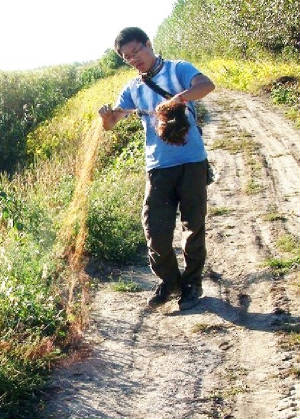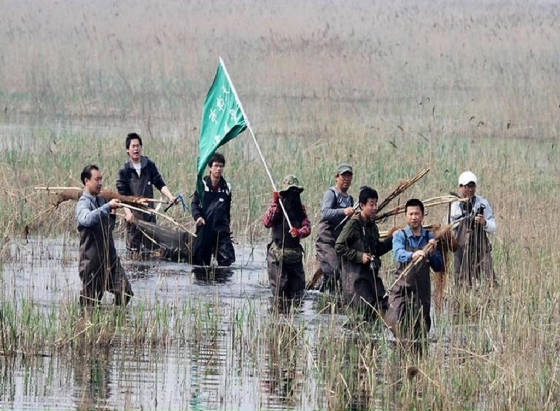|
Finding Nemo 26th October 2012

|
| Nemo... Inspiring a generation |
Many
years from now – at a point in time when the number of birds migrating through China is many, many millions more
than it is today; when membership of the CSPB (the China Society for the Protection of Birds) tops 10
million; and when every school in China has a birdwatching society – legions of older Chinese birdwatchers will
tell and re-tell the horror stories of the dark time when it wasn't like that. They
will tell the young ones of the time when, many years before, millions of migrant birds were slaughtered for their
meat or imprisoned in cages because of their beautiful plumage or melodious voice. They will tell
of the countless numbers of birds that were left to die in the trappers' nets because they were neither beautiful
nor edible. And they will talk of the time when not nearly enough people cared.
They will also recount the true story of how this began to change... and how
that became the story that inspired a generation of young people. Many
years from now, the school book "Protecting the
environment in China and how you can help" will tell of the events of the 15th
October 2012 and of the local heroes who, because of what happened on that date, were launched into the limelight to
become beacons of hope in what was a dark period for China's birds. This
is how the true story of what happened might be told: Guidong County was an out-of-the-way mountainous area in Hunan province. It
was a remote, backward place. It was also a lawless place. The
[Chinese] adage that "The mountains are high and the emperor is far away" was as true in Guidong in 2012 as
it was when the maxim was coined, a thousand years before. Hundreds of people in Guidong had guns (despite
this being a serious crime). Hunting parties of up to 200 would go out at night using high-power search lights
to lure huge numbers of migrating birds, which they mercilessly shot. This had been going on
for years. Everyone in Guidong, including
the local police and authorities, knew this was happening. But nothing had been done about it. Until,
that is, a very brave reporter from the Changsha Evening News, the provincial capital's most popular newspaper, went to Guidong
to expose the criminality there. In several visits, Li Feng infiltrated the hunters' ring and compiled
the evidence that would be the catalyst that changed attitudes. He secretly filmed the hunters at their "safe
houses", the night-time shooting parties, and also filmed the traders selling the carcasses of the shot birds in
local markets. In Guidong, the market price of a bird was determined by the length of the
bird's neck and by the taste of its meat. Xinhua [China's official news agency] reported that: "Birds with long necks, such as egrets and herons, sold for between 10 [US$1.60] and 70 yuan,
while short-necked eagles and owls are priced at hundreds of yuan as the taste of their meat is preferred." Xinhua
also reported that in the counties of Guidong, Xinhua and Xinshao, hunting parties from one village alone could kill,”150 tonnes of wild birds a year". The local hunting parties also included rich people from outside the area who would
pay a lot of money to shoot herons, egrets, owls, and eagles and "...Come
in luxury limousines with beauties and beers, taking it as an aristocratic pastime, which has become a troublesome fashion" [Xinhua
reported, citing Mr Yang, a local forestry worker]. In the autumn migration of 2012, Li Feng, a local-hero journalist risked his life to shoot
the video that exposed the gunmen's evil deeds. The video also pointed the finger at the corrupt
local police and officials who allowed this to happen under their noses. The video first ran locally in Hunan.
The people who saw it were outraged. So much so that they told others about it. In turn, these people passed on the link to their friends and contacts.
The ever vigilant TV networks, realising that this was becoming a big story, began screening the video locally (in dozens
of different places). By the end of the 14th October, many thousands of people had seen the video. Then,
on October 15th, there was a tipping point. During that day, interest in the story reached critical mass... and
the social media version of a reactor meltdown was unleashed. Interest
in the story exploded with such incredible ferocity that, by the end of that day, millions of people had seen the video or
read about the atrocities that had been perpetrated in Hunan province. The public was horrified and very, very
angry. One blogger, a Ms Liang, wrote on Sina Weibo, "How could this happen??!! We should be ashamed!! The corrupt officials who let them [the
gunmen] get away with it must be severely punished!!" In the days following this news peak, more and more influential news agencies published
their condemnation of not just the slaughter, but also the local authorities' complicity. The
China Daily released a hard-hitting opinion piece (that had first appeared in the Beijing News), which summed up
the problem and the solution: "The
truth is that local forestry officials and police are shirking responsibility, because they can stop the brutal killing of
birds if they strengthen joint law enforcement. For a change, they can stop the selling and buying of migratory birds in local
markets, and impose heavy fines on people indulging in such activities".

|
| Stop!! In the name of love [of birds] |
In the following two weeks, hundreds of news articles about the suffering inflicted
on wild birds all across China were published [before that, there had been only a handful written every year].
Then, gradually, the focus of the media's attention shifted from the problem to the solution... to the urgent need to
protect China's birds. That's when the news agencies began
to appreciate the importance of people like Nemo, who had been doing something about the problem for a long time [but
had, until then, not received any recognition from the media because bird protection had not been a "hot"
topic]. Some very big news agencies began to take an interest in
Nemo and what he and his 20 strong group of friends were doing in Tianjin. This band of brothers [and quite a few
sisters] from universities in Tianjin, had decided enough was enough, and had made it their business to destroy
any nets they found while they were out watching birds around the local lakes and marshes. One of Nemo's friends, Mr Ma [famous in birdwatching circles for having wrestled guns away from hunters],
helped to organise the raids with military precision. This fearless group of bird-protectors donned wading boots and splashed
into the marsh with their flag held high [see the photo below]. After a lot of hard work, the local heroes marched
out again with hundreds of metres of illegal nets, which they later burnt. They also managed to release at least
one bird from the net that would otherwise have died. A very influential
editor from a famous national news bureau, who had already been very supportive of the cause [by publishing a number
of articles in a bid to defend China's birds] pledged his support for the students from Tianjin and their principled
stand against the forces of evil. He also worked hard to persuade his network of editors and reporters of other
high-profile news agencies that the issues surrounding the protection of wild birds was something that deserved far more column-inches
and TV coverage. This media activity created a second wave
of interest that kept the issue front-of-mind on the weibos [China's Twitter-like social network sites that
have hundreds of millions of active users]. The virtuous
cycle [of news stories generating comment in social media, which in turn makes more national and local news agencies more
likely to cover the story and, consequently, provokes more people to tweet and re-tweet about it... and so on and so forth]
had now gathered even greater force. To the extent that, all across China, provincial and local media companies began to realise the importance of finding their very own Nemo. The rest, as they say, is history.

|
| Local heroes. Please click on the photo to see more photos of them. |
|

